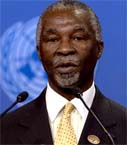South Africa's Mbeki to grapple with Zimbabwe at UN
 Washington/New York - South African President Thabo Mbeki had intended to lead a summit Wednesday at the United Nations in New York that would focus on the increasing peacekeeping chores - and the need for more UN support - of African Union troops.
Washington/New York - South African President Thabo Mbeki had intended to lead a summit Wednesday at the United Nations in New York that would focus on the increasing peacekeeping chores - and the need for more UN support - of African Union troops.
But on Tuesday, it became clear that Mbeki would not be able to dodge the ongoing election crisis in South Africa's neighbour, Zimbabwe.
Mbeki is the object of rising international criticism of his own reticence to take a stand on Zimbabwe's deteriorating economic and human-rights situation and the role played by its longtime President Robert Mugabe in the decline.
Although South Africa had intended to avoid discussing Zimbabwe, UN Secretary General Ban Ki-Moon said he planned to put it on the agenda.
"The meeting will provide a natural opportunity to raise the situation in Zimbabwe," Ban told reporters.
Mbeki, who for years has defended Mugabe even in defiance of his own party, the African National Congress, stirred criticism over the weekend when he denied that there was a "crisis" in Zimbabwe.
Zimbabwe held presidential elections more than two weeks ago, but the elections commission has refused to release the results - yet at the same time is calling for a recount.
Over the weekend, 14 African nations met to try to resolve the standoff. Opposition leader Morgan Tsvangirai claims that he outright defeated Mugabe - an assessment shared by independent observers and non-governmental organizations.
Mugabe claims the race was too close to call and that a runoff is needed. He is supported by Mbeki in his claim.
"There is no crisis," Mbeki declared after stopping to meet with Mugabe on his way to the regional meeting in Zambia.
Tuesday in Washington, the US State Department disagreed.
"Zimbabwe is in a crisis. We are in a crisis in Zimbabwe," State Department spokesman Sean McCormack said.
He challenged the recount plans. "Anything could have happened between election day and when a recount takes place," McCormack said.
McCormack said that Mugabe's policies and repression have driven Zimbabwe into economic run. The country is suffering 100,000-per-cent hyperinflation and shortages of fuel and food.
The idea of Wednesday's Africa summit was to use South Africa's presidency of the UN Security Council to raise the profile of Africa's cooperation with the United Nations. Heads of state are to attend including Britis Prime Minister Gordon Brown and Italian Prime Minister Romano Prodi, as well as AU Chairman Alpha Oumar Konare.
Even South Africa's leadership on the Security Council came under fire Tuesday, as the Washington Post weighed in with a particularly scathing editorial about Johannesburg's role in New York.
In an editorial entitled "Rogue Democrat," the Post charged that South Africa had shielded Sudan and Burma from the "sort of pressure the United Nations once directed at the apartheid regime" and had allied itself with the world's "rogue states and against the Western democracies."
The Post criticized Mbeki for using South Africa's "considerable influence and prestige to bolster Mr Mugabe" and hoped that when Mbeki left office in a year, South Africa's "democracy may yet rectify a foreign policy that is shaming South Africa."
Facing pressure from many sides inside the United Nations, Mbeki may not even be able to look into the sky for solace.
The Internet advocacy group Avaaz. org, aiming to raise international urgency pressure for democracy in Zimbabwe, plans to trail a 300-square-metre banner from the back of a plane circling near the UN's Manhattan headquarters, proclaiming: "Mbeki, It's Time To Act: Democracy For Zimbabwe."
Avaaz. org executive director Ricken Patel said that Mbeki was in danger of "betraying the principles of the worldwide movement that helped bring democracy to his own country." (dpa)